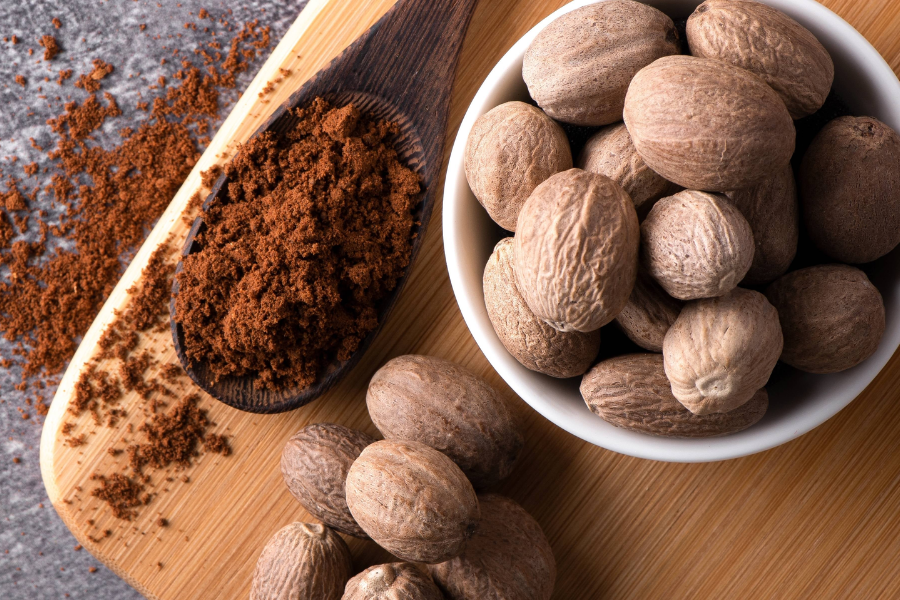Introduction
Nutmeg, a popular spice known for its warm, nutty flavor, often features in sweet and savory dishes alike. Beyond its culinary appeal, many wonder, “Is nutmeg good for you?” This article explores the health benefits, nutritional content, historical uses, potential risks, and safe consumption of nutmeg to help you make informed decisions.
Overview of Nutmeg
The Myristica fragrans tree, which is indigenous to Indonesia’s Maluku Islands (sometimes called the Spice Islands), yields nutmeg seeds. The seed is dried and ground into a powder to create the spice. Both nutmeg and its sister spice, mace (the dried lacy covering of the nutmeg seed), are valued for their distinct aroma and taste.
Historical Uses
Nutmeg has long been valued for purposes other than flavour. Ancient civilizations used it in traditional medicine for its supposed healing properties, such as treating digestive issues, boosting brain function, and even acting as an aphrodisiac. In medieval Europe, nutmeg was so highly prized that wars were fought over its control.
Nutritional Profile of Nutmeg
Vitamins and Minerals
Nutmeg is rich in a variety of vitamins and minerals, including:
- Manganese: Essential for bone health and metabolism.
- Copper: Vital for the health of the heart and immune system.
- Magnesium: Supports muscle and nerve function.
- Vitamin B6: Supports the growth and operation of the brain.
- Folate: Important for DNA synthesis and repair.
Caloric Content
For a spice, nutmeg has a rather high calorie content. One tablespoon (about 7 grams) provides approximately:
- Calories: 37
- Fat: 2.5 grams
- Carbohydrates: 4 grams
- Fiber: 1.5 grams
- Protein: 0.4 grams
Since it’s used in small quantities, its calorie impact in most diets is minimal.
Health Benefits of Nutmeg
Digestive Health
Nutmeg has long been used as a remedy for digestive problems. It can help relieve gas, bloating, diarrhea, and indigestion by stimulating digestive enzymes and easing gastrointestinal distress.
Pain Relief and Anti-Inflammatory Properties
Nutmeg contains compounds like myristicin and eugenol, which have anti-inflammatory and analgesic (pain-relieving) effects. These properties make nutmeg a natural option for managing chronic pain, such as arthritis or muscle soreness.
Cognitive and Mood Benefits
Nutmeg may promote mental and cognitive wellness, according to research. The spice’s compounds have shown potential in enhancing memory, reducing symptoms of depression, and promoting relaxation.
Sleep Aid
Nutmeg is a traditional remedy for insomnia. Small doses before bedtime can help induce sleep by calming the mind, likely due to its sedative properties.
Antioxidant Effects
Antioxidants found in nutmeg shield the body from oxidative stress. These antioxidants help combat free radicals, potentially reducing the risk of chronic diseases such as cancer and heart disease.
Potential Risks and Side Effects
Toxicity at High Doses
While nutmeg offers many benefits, excessive consumption can be dangerous. Large amounts (typically more than two teaspoons at once) can cause nutmeg poisoning, leading to symptoms like:
- Hallucinations
- Nausea
- Dizziness
- Heart palpitations
- Even organ failure in extreme cases
This toxicity is primarily due to the myristicin content.
Allergic Reactions
Some individuals may be allergic to nutmeg. Symptoms can include skin rashes, itching, and respiratory difficulties. Always start with small amounts if trying nutmeg for the first time.
Drug Interactions
Nutmeg can interact with certain medications, especially those that affect the central nervous system, like sedatives or antidepressants. If you are taking medication, consult your doctor before significantly increasing your nutmeg intake.
How to Use Nutmeg Safely
Recommended Dosage
Experts recommend limiting nutmeg intake to no more than 1/4 to 1/2 teaspoon per meal. This amount is enough to enjoy its flavor and health benefits without risking side effects.
Culinary Uses
Nutmeg enhances both sweet and savory dishes. Popular uses include:
- incorporating into baked products such as pies, cakes, and cookies
- Sprinkling over beverages like lattes or eggnog
- Flavoring creamy sauces, soups, and curries
- Seasoning vegetables like spinach and squash
Medicinal Applications
In traditional medicine, nutmeg oil is often used externally for its pain-relieving properties, and nutmeg powder is included in remedies for digestion and sleep.
Always remember: moderation is key.
Conclusion
So, is nutmeg good for you? Absolutely—when used in moderation. Nutmeg offers numerous health benefits, from improving digestion to supporting mental well-being and providing antioxidant protection. But overindulging might have detrimental effects on one’s health. By using nutmeg thoughtfully and sparingly, you can enjoy its unique flavor and medicinal qualities safely.
FAQs
1. Can I eat nutmeg every day?
Yes, but only in very small amounts—no more than 1/4 teaspoon per day is considered safe.
2. Is nutmeg good for the skin?
Yes, nutmeg has antibacterial and anti-inflammatory properties that can benefit the skin when used topically in face masks or creams.
3. Can nutmeg make you sleepy?
Yes, a small amount of nutmeg can help with sleep and have a relaxing, sedative effect.
4. What happens if you eat too much nutmeg?
Overconsumption can cause nutmeg poisoning, leading to nausea, dizziness, hallucinations, and in extreme cases, serious medical complications.
5. Is nutmeg good for the heart?
Although more studies are required to demonstrate significant cardiovascular benefits, nutmeg contains anti-inflammatory and antioxidant substances that may support heart health.
For more health tips and wellness advice, visit Tech.Mex.com.



